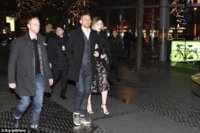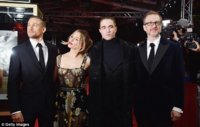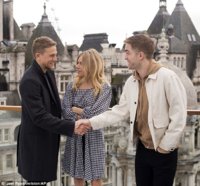You are using an out of date browser. It may not display this or other websites correctly.
You should upgrade or use an alternative browser.
You should upgrade or use an alternative browser.
Charlie Hunnam
- Thread starter CoachGirl12
- Start date
TPF may earn a commission from merchant affiliate
links, including eBay, Amazon, and others
More options
Who Replied?The Lost City of Z review: Charlie Hunnam slow-burns down the Amazon, leaving Sienna Miller at home
James Gray brings a characteristically muted, slow-burn intensity of purpose to this odd, interesting period drama. It is based on the true story of Col Percival Fawcett, a British explorer and army officer of the last century who became obsessed with what he was convinced was a lost city he called “Z”, deep in the Amazon jungle: a vanished civilisation overlooked by the historical and archaeological establishment. For his screenplay, Gray has adapted the 2005 New Yorker article and subsequent book about Fawcett by David Grann. It’s a curious film in some ways, taking what could be an exciting epic adventure in the style of David Lean and turning it into something introspective, slightly morose and anti-climactic. Yet there is a persistent, beady-eyed intelligence at work.
Gray’s film shows that Fawcett’s involvement in Amazon exploration has its origin in his being asked by the Royal Geographical Society to act as an honest broker in a border dispute between South American states about where national territories began and ended, which in turn arose from exploitation of local resources. But while there, Fawcett rises above commercial concerns and even the traditional thrill of imperial prestige. He finds fragments of pots and evidence of ruined sculpture, which triggers a lifetime’s obsession and a need to prove himself to the snobs and prigs who had looked down on him for being not quite top drawer. His Amazon journeys happen as storm clouds of war are gathering; the trips are in some ways driven by the same misplaced romantic need to prove masculinity and hardihood – but also a need to avoid and escape, to turn one’s back on the squalor of conflict.
Charlie Hunnam plays Fawcett himself and Sienna Miller gives a good performance as his wife, Nina; Tom Holland is Hunnam’s son Tom, who was to accompany him on his last fateful trip into the jungle, and Robert Pattinson is Henry Costin, his bearded and dishevelled assistant.
Advertisement
It is an unusual film in that it appears to invoke the familiar ideas of Conrad’s Heart of Darkness or Werner Herzog’s Aguirre, the Wrath of God, but does something different with them. It is more episodic. This is not about a single, epic, crazily hubristic journey into the jungle, in which the increasingly panicky participants have a catastrophic encounter with barbarism that in turns discloses the savage greed within the western adventurer’s own soul. There are some familiar images: a terrifying upriver journey, deadly arrows from tribesmen hidden in the foliage, bleached skulls, signs of cannibalism, loss of nerve and erosion of discipline within the explorers’ ranks – and a surreal encounter with an opera. But Gray shows something that is anti-Conrad and anti-Herzog: that explorers can return home safely, become feted for their exploits, have unwelcome encounters with duplicitous colleagues – but resolve to go back out there.
It happens time and again, and Fawcett’s need to return is not even extinguished by the first world war, which is evoked with brutal confidence. His troubled relationship with his son brought to my mind Kipling’s anguished memories of his son, lost in the war and memorialised in his poem My Boy Jack.
Where another sort of film might periodically crank up the tempo and amplify the drama and passion, Gray sternly keeps things lower and slower, with a concerted evenness, as if wanting us to remain detached from Fawcett’s passions. It makes for a slightly opaque movie in some ways, yet one that remains coolly and cerebrally engaged.
James Gray brings a characteristically muted, slow-burn intensity of purpose to this odd, interesting period drama. It is based on the true story of Col Percival Fawcett, a British explorer and army officer of the last century who became obsessed with what he was convinced was a lost city he called “Z”, deep in the Amazon jungle: a vanished civilisation overlooked by the historical and archaeological establishment. For his screenplay, Gray has adapted the 2005 New Yorker article and subsequent book about Fawcett by David Grann. It’s a curious film in some ways, taking what could be an exciting epic adventure in the style of David Lean and turning it into something introspective, slightly morose and anti-climactic. Yet there is a persistent, beady-eyed intelligence at work.
Gray’s film shows that Fawcett’s involvement in Amazon exploration has its origin in his being asked by the Royal Geographical Society to act as an honest broker in a border dispute between South American states about where national territories began and ended, which in turn arose from exploitation of local resources. But while there, Fawcett rises above commercial concerns and even the traditional thrill of imperial prestige. He finds fragments of pots and evidence of ruined sculpture, which triggers a lifetime’s obsession and a need to prove himself to the snobs and prigs who had looked down on him for being not quite top drawer. His Amazon journeys happen as storm clouds of war are gathering; the trips are in some ways driven by the same misplaced romantic need to prove masculinity and hardihood – but also a need to avoid and escape, to turn one’s back on the squalor of conflict.
Charlie Hunnam plays Fawcett himself and Sienna Miller gives a good performance as his wife, Nina; Tom Holland is Hunnam’s son Tom, who was to accompany him on his last fateful trip into the jungle, and Robert Pattinson is Henry Costin, his bearded and dishevelled assistant.
Advertisement
It is an unusual film in that it appears to invoke the familiar ideas of Conrad’s Heart of Darkness or Werner Herzog’s Aguirre, the Wrath of God, but does something different with them. It is more episodic. This is not about a single, epic, crazily hubristic journey into the jungle, in which the increasingly panicky participants have a catastrophic encounter with barbarism that in turns discloses the savage greed within the western adventurer’s own soul. There are some familiar images: a terrifying upriver journey, deadly arrows from tribesmen hidden in the foliage, bleached skulls, signs of cannibalism, loss of nerve and erosion of discipline within the explorers’ ranks – and a surreal encounter with an opera. But Gray shows something that is anti-Conrad and anti-Herzog: that explorers can return home safely, become feted for their exploits, have unwelcome encounters with duplicitous colleagues – but resolve to go back out there.
It happens time and again, and Fawcett’s need to return is not even extinguished by the first world war, which is evoked with brutal confidence. His troubled relationship with his son brought to my mind Kipling’s anguished memories of his son, lost in the war and memorialised in his poem My Boy Jack.
Where another sort of film might periodically crank up the tempo and amplify the drama and passion, Gray sternly keeps things lower and slower, with a concerted evenness, as if wanting us to remain detached from Fawcett’s passions. It makes for a slightly opaque movie in some ways, yet one that remains coolly and cerebrally engaged.
Charlie Hunnam Mentions Marriage and Kids as He Considers His Work-Life Balance
Charlie Hunnam has been quite busy over the past few years, but he's working on finding more of a balance in his life as he considers marriage and children in his future. The actor stars in two big movies out this Spring, The Lost City of Z and King Arthur, and he's been working steadily since he wrapped Sons of Anarchy in late 2014. Back in December, Charlie acknowledged that he cut off communication with his longtime girlfriend, Morgana McNelis, while filming The Lost City of Z, admitting that the move was a bit too method. He elaborated on the struggle to find a work-life balance in the latest issue of Total Film, which is out now.
"I have an incredibly understanding girlfriend who is requiring more and more as we get older that I figure out a way to balance these things a little better," he said. "I've gotten off pretty easily so far, with being able to just disappear and be completely selfish and singular in my focus, but if we're going to start talking about having children and getting married then I'm going to have to figure out a way to balance that a little bit more effectively."
Add that to the many sweet things Charlie's said about his relationship (and, yes, that's your cue to go ahead and swoon over the thought of him as a cute dad).
Charlie Hunnam has been quite busy over the past few years, but he's working on finding more of a balance in his life as he considers marriage and children in his future. The actor stars in two big movies out this Spring, The Lost City of Z and King Arthur, and he's been working steadily since he wrapped Sons of Anarchy in late 2014. Back in December, Charlie acknowledged that he cut off communication with his longtime girlfriend, Morgana McNelis, while filming The Lost City of Z, admitting that the move was a bit too method. He elaborated on the struggle to find a work-life balance in the latest issue of Total Film, which is out now.
"I have an incredibly understanding girlfriend who is requiring more and more as we get older that I figure out a way to balance these things a little better," he said. "I've gotten off pretty easily so far, with being able to just disappear and be completely selfish and singular in my focus, but if we're going to start talking about having children and getting married then I'm going to have to figure out a way to balance that a little bit more effectively."
Add that to the many sweet things Charlie's said about his relationship (and, yes, that's your cue to go ahead and swoon over the thought of him as a cute dad).
Transporting and profound, The Lost City of Z is an instant classic - review
5
Director: James Gray. Starring: Charlie Hunnam, Sienna Miller, Robert Pattinson, Angus Macfadyen, Tom Holland, Ian McDiarmid. 15 cert, 141 mins.
Rudyard Kipling understood what made Percy Fawcett tick. In his 1898 poem The Explorer, Kipling wrote of a man spurred to adventure by a voice – not a divine, cloud-parting rumble, but a relentless inner whisper, needling him with the prospect of wonders “lost behind the Ranges”, waiting for discovery to make them real.
Fawcett heard that voice and heeded it. Born in 1867, he was an archaeologist and Colonel in the Royal Artillery, who became convinced, during a series of mapping expeditions to the Amazon, that somewhere in the jungle was a city of gold and maize – so ancient it perhaps predated western civilisation itself. The evidence was sparse and tenuous: handed-down native testimony, caches of pottery and sculpture, strange sigils carved in rock. But Fawcett couldn’t rest until he’d seen where the river led.
That journey to the river’s source – as much a voyage of the mind as a trek through real-world undergrowth – is the stuff of James Gray’s The Lost City of Z, a film as transporting, profound and staggering in its emotional power as anything I’ve seen in the cinema in years. As a piece of historical drama (it was adapted by Gray from the non-fiction book of the same name by David Grann) it’s sincere and scrupulous.
As a work of filmmaking, it’s an immediate classic, fit to stand beside the best of Werner Herzog and Stanley Kubrick – though it’s also entirely its own thing, classical to its bones yet not quite like anything that’s come before it. In earlier films like The Immigrant and We Own The Night, I’ve occasionally found Gray’s careful, level-headed style a little distancing and hard to love. After this one, I had to retrieve my soul from the ceiling with a long-handled feather duster.
Fawcett is wonderfully played by Charlie Hunnam, the heartthrobby star of the TV series Sons of Anarchy and the Guillermo del Toro films Pacific Rim and Crimson Peak. It’s a role built on complex, not-obviously-cinematic qualities like decency, honour and conviction, but Hunnam brings them to life with total persuasiveness.
The film opens with a disembodied shot of fires and drums in a jungle clearing – the secret’s already waiting for Fawcett, before he even knows he wants to find it – then moves to a British army barracks in Cork, Ireland, 1905, where he and his fellow officers are deer coursing.
The hunt sequence is a dream of pageantry – the camera scampering with the gun dogs one moment then soaring overhead the next, all to stirring bagpipe music. (The soundtrack includes a radiant, yearning score by Christopher Spelman and perfectly chosen works by Stravinsky, Ravel, Strauss, Verdi and Beethoven.)
Fawcett gets the kill, but he’s kept at arm’s length from the celebrations by his class. As one of his social betters piteously sniffs, he has been “rather unfortunate in his choice of ancestors”: in other words, his father was a gambler and a drunk.
So when Ian McDiarmid’s Royal Geographical Society grandee asks Fawcett to travel to South America and resolve a land dispute between Bolivia and Brazil, he suggests the two-year quest could be a means of reclaiming his family name. Fawcett accepts, even though it means leaving behind his beloved wife Nina (Sienna Miller) and son Jack (played as a child by Tom Mulheron and Bobby Smalldridge, and later as a teenager by Tom Holland). Eternity comes before the here and now.
On the voyage to Bolivia, Fawcett meets his thickly bearded aide-de-camp Henry Costin, played by Robert Pattinson as a sort of winningly eccentric Tintin supporting character Hergé never quite got around to thinking up. There is an astonishing moment when Fawcett forces Costin to pour the contents of his hip flask down the sink – both men need to be sober and ready for the challenges ahead – and in a nod to Lawrence of Arabia’s iconic transition from blown-out match to rising desert sun, Gray cuts from the coppery trickle of brandy to a steam train pounding though the wilderness.
Though Fawcett is an arch-keeper of his cool, the jungle itself ripples with Herzogian lunacy: take the lumber-built opera house, complete with orchestra, which he and Costin find by night in a clearing, presided over by a rubber baron (Franco Nero) lounging by a trove of silverware in a tattered white morning suit. It genuinely feels like uncharted territory – and on later expeditions, old swashbuckling standbys like spear-shaking cannibals and shoals of killer piranhas feels freshly fantastical and dangerous.
It’s on his first trip that Fawcett makes the archeological discoveries which prompt his theory of the existence of the City of Z (pronounced ‘Zed’) – which, at a Royal Society summit back in London, he calls “the ultimate piece of the human puzzle.” His belief that, civilisation-wise, the British Empire might be playing catch-up with “the primitive jungle man” causes a blaze of uproar that makes Fawcett all the keener to confirm it.
From here, we watch Fawcett on further expeditions in the jungle, spending time with his family back in England, and also fighting in the trenches of the Somme. All three parts feel essential. Miller may have never been better than she is as Nina, sensationally capturing the scope and complexity of her character’s frustrations as an ambitious, capable woman who knows her destiny is to be left at home. (She gets the film’s final shot, and it’s an all-timer.)
Nina quotes that Kipling poem in a letter to her husband, for inspiration and perhaps also comfort. Later she turns to Browning’s Andrea del Sarto: “Ah, but a man’s reach should exceed his grasp,/Or what’s a heaven for?”
The Lost City of Z isn’t straightforwardly religious, but the possibility of an afterlife of sorts is suggested in Fawcett's shifting relationship with his eldest son, which may be the most beautiful thing in the film. Late on, there’s a shot of the father standing on the prow of a low hill, watching his boy shoot rabbits. The older man, once the centre of attention, has become a small silhouette in his own story as he watches his son race into the foreground. In context, it’s one of the most acute and overpowering expressions of fatherhood on film I’ve ever seen.
Most period dramas would be content if you left the cinema able to pick out their particular place in history. The Lost City of Z asks you to contemplate your own. It’s a film that knows every life is a stretch of the same great river, whose golden source remains forever just around the bend, and out of sight.
5
Director: James Gray. Starring: Charlie Hunnam, Sienna Miller, Robert Pattinson, Angus Macfadyen, Tom Holland, Ian McDiarmid. 15 cert, 141 mins.
Rudyard Kipling understood what made Percy Fawcett tick. In his 1898 poem The Explorer, Kipling wrote of a man spurred to adventure by a voice – not a divine, cloud-parting rumble, but a relentless inner whisper, needling him with the prospect of wonders “lost behind the Ranges”, waiting for discovery to make them real.
Fawcett heard that voice and heeded it. Born in 1867, he was an archaeologist and Colonel in the Royal Artillery, who became convinced, during a series of mapping expeditions to the Amazon, that somewhere in the jungle was a city of gold and maize – so ancient it perhaps predated western civilisation itself. The evidence was sparse and tenuous: handed-down native testimony, caches of pottery and sculpture, strange sigils carved in rock. But Fawcett couldn’t rest until he’d seen where the river led.
That journey to the river’s source – as much a voyage of the mind as a trek through real-world undergrowth – is the stuff of James Gray’s The Lost City of Z, a film as transporting, profound and staggering in its emotional power as anything I’ve seen in the cinema in years. As a piece of historical drama (it was adapted by Gray from the non-fiction book of the same name by David Grann) it’s sincere and scrupulous.
As a work of filmmaking, it’s an immediate classic, fit to stand beside the best of Werner Herzog and Stanley Kubrick – though it’s also entirely its own thing, classical to its bones yet not quite like anything that’s come before it. In earlier films like The Immigrant and We Own The Night, I’ve occasionally found Gray’s careful, level-headed style a little distancing and hard to love. After this one, I had to retrieve my soul from the ceiling with a long-handled feather duster.
Fawcett is wonderfully played by Charlie Hunnam, the heartthrobby star of the TV series Sons of Anarchy and the Guillermo del Toro films Pacific Rim and Crimson Peak. It’s a role built on complex, not-obviously-cinematic qualities like decency, honour and conviction, but Hunnam brings them to life with total persuasiveness.
The film opens with a disembodied shot of fires and drums in a jungle clearing – the secret’s already waiting for Fawcett, before he even knows he wants to find it – then moves to a British army barracks in Cork, Ireland, 1905, where he and his fellow officers are deer coursing.
The hunt sequence is a dream of pageantry – the camera scampering with the gun dogs one moment then soaring overhead the next, all to stirring bagpipe music. (The soundtrack includes a radiant, yearning score by Christopher Spelman and perfectly chosen works by Stravinsky, Ravel, Strauss, Verdi and Beethoven.)
Fawcett gets the kill, but he’s kept at arm’s length from the celebrations by his class. As one of his social betters piteously sniffs, he has been “rather unfortunate in his choice of ancestors”: in other words, his father was a gambler and a drunk.
So when Ian McDiarmid’s Royal Geographical Society grandee asks Fawcett to travel to South America and resolve a land dispute between Bolivia and Brazil, he suggests the two-year quest could be a means of reclaiming his family name. Fawcett accepts, even though it means leaving behind his beloved wife Nina (Sienna Miller) and son Jack (played as a child by Tom Mulheron and Bobby Smalldridge, and later as a teenager by Tom Holland). Eternity comes before the here and now.
On the voyage to Bolivia, Fawcett meets his thickly bearded aide-de-camp Henry Costin, played by Robert Pattinson as a sort of winningly eccentric Tintin supporting character Hergé never quite got around to thinking up. There is an astonishing moment when Fawcett forces Costin to pour the contents of his hip flask down the sink – both men need to be sober and ready for the challenges ahead – and in a nod to Lawrence of Arabia’s iconic transition from blown-out match to rising desert sun, Gray cuts from the coppery trickle of brandy to a steam train pounding though the wilderness.
Though Fawcett is an arch-keeper of his cool, the jungle itself ripples with Herzogian lunacy: take the lumber-built opera house, complete with orchestra, which he and Costin find by night in a clearing, presided over by a rubber baron (Franco Nero) lounging by a trove of silverware in a tattered white morning suit. It genuinely feels like uncharted territory – and on later expeditions, old swashbuckling standbys like spear-shaking cannibals and shoals of killer piranhas feels freshly fantastical and dangerous.
It’s on his first trip that Fawcett makes the archeological discoveries which prompt his theory of the existence of the City of Z (pronounced ‘Zed’) – which, at a Royal Society summit back in London, he calls “the ultimate piece of the human puzzle.” His belief that, civilisation-wise, the British Empire might be playing catch-up with “the primitive jungle man” causes a blaze of uproar that makes Fawcett all the keener to confirm it.
From here, we watch Fawcett on further expeditions in the jungle, spending time with his family back in England, and also fighting in the trenches of the Somme. All three parts feel essential. Miller may have never been better than she is as Nina, sensationally capturing the scope and complexity of her character’s frustrations as an ambitious, capable woman who knows her destiny is to be left at home. (She gets the film’s final shot, and it’s an all-timer.)
Nina quotes that Kipling poem in a letter to her husband, for inspiration and perhaps also comfort. Later she turns to Browning’s Andrea del Sarto: “Ah, but a man’s reach should exceed his grasp,/Or what’s a heaven for?”
The Lost City of Z isn’t straightforwardly religious, but the possibility of an afterlife of sorts is suggested in Fawcett's shifting relationship with his eldest son, which may be the most beautiful thing in the film. Late on, there’s a shot of the father standing on the prow of a low hill, watching his boy shoot rabbits. The older man, once the centre of attention, has become a small silhouette in his own story as he watches his son race into the foreground. In context, it’s one of the most acute and overpowering expressions of fatherhood on film I’ve ever seen.
Most period dramas would be content if you left the cinema able to pick out their particular place in history. The Lost City of Z asks you to contemplate your own. It’s a film that knows every life is a stretch of the same great river, whose golden source remains forever just around the bend, and out of sight.
Register on TPF! This sidebar then disappears and there are less ads!














 but what happened to Robert??
but what happened to Robert??




